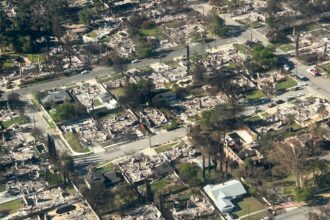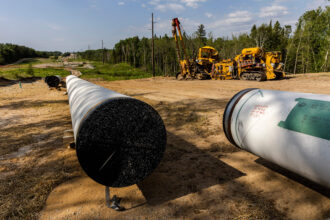Just a week after Texas voters approved billions of dollars to build new gas-fired power plants, the state’s education board will decide if it wants schools using science textbooks that acknowledge that burning fossil fuels warms the planet.
The Texas Board of Education could vote as early as next Tuesday on whether it will recommend state school districts to use a batch of new science textbooks, which include accurate descriptions of the causes and effects of climate change. While recommendations by the Republican-dominated board do not carry legal weight, they have an outsized influence on the educational priorities in Texas and can have rippling effects in other school districts nationwide.
Before the board votes, it will hear testimony from the public, including from the state’s top energy regulator, who is urging the board to reject the books, saying they “could promote a radical environmental agenda.”
In a letter addressed to the board on Nov. 1, Republican Railroad Commissioner Wayne Christian criticized climate science as a “woke environmental agenda” and encouraged the board to adopt books that promote the importance of fossil fuel energy.
“Despite what the mainstream media reports, the debate over climate change is far from settled, as none of the catastrophic events they predicted in the last 20 years have occurred,” Christian wrote. “These catastrophists are using the CO2 boogeyman and the threat of apocalypse to frighten people into submission.”
That message appears to fall in line with guidance the state education board adopted earlier this spring, which urges schools to emphasize the “positive” aspects of fossil fuels in science textbooks, E&E News reported.
There is overwhelming consensus among peer-reviewed research on climate change, which shows that Earth’s average temperature has risen at an unprecedented rate since the Industrial Revolution, predominantly because humans have been burning fossil fuels. The world has already warmed about 1.2 degrees Celsius above pre-industrial levels, and climate scientists say the planet is on track for 3 degrees of warming by the end of this century if fossil fuel production isn’t drastically reduced in the coming years.
The result of such warming, scientists warn, will be that the kind of extreme weather experienced this summer will become even more frequent and severe. This week, a new peer-reviewed study found that the last 12 months were the hottest ever recorded on Earth, with climate change largely responsible for the record-high temperatures felt by much of the world between November 2022 and October 2023.
Despite that evidence, Republican lawmakers and right-wing activists have increasingly framed climate science through culture war rhetoric, often downplaying the consequences of global warming and spreading misleading and false claims about its causes—including that natural phenomena are responsible.
This spring, for example, former Arkansas Gov. Mike Huckabee published an educational magazine aimed at children titled “The Kids Guide to the Truth About Climate Change,” which some education advocates denounced as ideological propaganda. The magazine asserts that climate change is occurring as part of the planet’s natural cycle and ignores the scientific evidence that shows that temperatures warmed 10 times faster in the last century than they did in the previous 5,000 years—a trend change that corresponds with industrialization and fossil fuel use.
In fact, climate change is now among the several topics that conservative politicians call “woke” and are attempting to ban from being taught in schools.
Book bans in the United States have skyrocketed in recent years, jumping 400 percent this year compared to last year, according to the free speech advocacy nonprofit PEN America. The group has tracked more than 2,800 individual book titles that have been banned by school districts in the last two years alone, with nearly 6,000 instances of a district implementing some kind of ban policy.
Texas has implemented more book bans than every other state except Florida, a recent PEN America report found, with 625 bans currently in place as of this summer. Authors whose books are targeted are most frequently female, people of color and individuals who identify as LGBTQ, the report noted.
In that sense, if the Texas Board of Education decides next week to oppose the use of the new science textbooks, which accurately describe climate change, it may encourage some school districts to ban such books from being used in their classrooms and potentially create a new generation of climate skeptics.
More Top Climate News
What Would Joe Manchin’s Open Senate Seat Mean for Climate Policy? West Virginia Sen. Joe Manchin—the Democrats’ most conservative member—announced he would not seek re-election next year, almost certainly handing his seat over to the Republican party, Burgess Everett reports for POLITICO. Considering the GOP only needs two seats to gain a majority in the Senate, the move will undoubtedly affect future climate policy.
US and China Reach “Understanding” on Climate Ahead of COP28: The United States and China have reached “understandings and agreements” on climate issues, David Stanway reports for Reuters, potentially dismantling key barriers to progress at the United Nations’ COP28 global climate summit being held later this month in Dubai. Common ground between the world’s two top economies and biggest greenhouse gas emitters is considered crucial for any consensus at COP28, which is expected to focus on issues like climate finance and more ambitious energy transition goals.
Many California Cities Are Understaffed and Unprepared to Mobilize Climate Funds: Local governments across the country have the opportunity to access an unprecedented amount of federal funding to combat climate change thanks to the Bipartisan Infrastructure Law and the Inflation Reduction Act. But a new report has found that potentially a third of California’s cities and counties lack the workforce necessary to capitalize on those investments, Sharon Udasin reports for The Hill. Of the jurisdictions that responded to the survey, 33 percent said they have no staff working on climate-related efforts.
Today’s Indicator
70%
That’s about how much global fossil fuel production currently planned through 2030 would need to be cut to put the world on track with 2°C of warming by the end of the century, a new United Nations report warned. That means governments are far from achieving any of the Paris Agreement targets.
About This Story
Perhaps you noticed: This story, like all the news we publish, is free to read. That’s because Inside Climate News is a 501c3 nonprofit organization. We do not charge a subscription fee, lock our news behind a paywall, or clutter our website with ads. We make our news on climate and the environment freely available to you and anyone who wants it.
That’s not all. We also share our news for free with scores of other media organizations around the country. Many of them can’t afford to do environmental journalism of their own. We’ve built bureaus from coast to coast to report local stories, collaborate with local newsrooms and co-publish articles so that this vital work is shared as widely as possible.
Two of us launched ICN in 2007. Six years later we earned a Pulitzer Prize for National Reporting, and now we run the oldest and largest dedicated climate newsroom in the nation. We tell the story in all its complexity. We hold polluters accountable. We expose environmental injustice. We debunk misinformation. We scrutinize solutions and inspire action.
Donations from readers like you fund every aspect of what we do. If you don’t already, will you support our ongoing work, our reporting on the biggest crisis facing our planet, and help us reach even more readers in more places?
Please take a moment to make a tax-deductible donation. Every one of them makes a difference.
Thank you,














